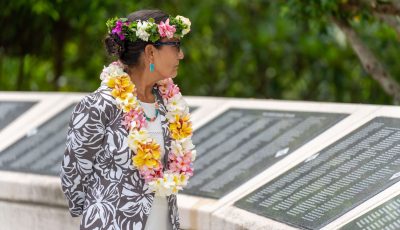Camacho denies motion to set aside man’s conviction for attempted rape
Camacho says Moots did provide effective legal assistance
Superior Court Associate Judge Joseph N. Camacho has determined that a Federated States of Micronesia citizen who was convicted in 2002 of attempted rape was given proper legal assistance, effectively denying the man’s bid to have his conviction set aside.
Camacho disagreed with Seremea Issy Nowell’s argument that he received ineffective legal assistance when then-assistant public defender Jeffrey A. Moots failed to advise him that he could possibly be deported if he pleaded guilty, or when Moots failed to negotiate a plea deal that had no immigration consequences.
In turning down Nowell’s request to vacate his conviction, the judge said Moots’ legal representation met the level that he was legally obligated to provide at the time, given the information available to him.
Camacho also ruled that the Superior Court is bound by duty to follow federal immigration laws despite Nowell’s health concerns.
In his emergency petition, Nowell, through attorney Pamela Brown-Blackburn, asked the court to set aside his 2002 attempted rape conviction, citing that his then-counsel Moots failed to advise him that his guilty plea would make him deportable.
Moots, however, pointed out that the CNMI government did not initiate removal proceedings against Nowell during Brown-Blackburn’s term as attorney general.
In his amicus curiae filing, Moots said during the six years he practiced in both the Office of the Public Defender and the Office of the Attorney General, he was not aware of any individual being deported based on that individual being convicted of a qualifying offense.
Moots said this is reinforced by the fact that Nowell’s now counsel, Brown-Blackburn, did not initiate removal proceedings against Nowell when she was the AG—the government official responsible for overseeing the CNMI immigration enforcement activities.
Moots, who now based in Guam, filed the amicus curiae after Camacho invited him and the U.S. Department of Homeland Security-Immigration and Customs Enforcement to participate and be heard at the hearing of Nowell’s petition.
Moots said while he also served as chief prosecutor for the CNMI and supervising the attorneys who litigated removal actions, the only individuals who faced removal proceedings did so for violating their work permit conditions.
Moots noted that in 2002 he had no way of knowing that seven years later, the CNMI would lose control over its immigration process and become subject to federal law.
Moots said the reality is that Nowell, if convicted of kidnapping, would have faced a mandatory life in prison. Therefore, he said, obtaining a plea with a maximum possible sentence of five years significantly reduced Nowell’s sentencing exposure.
On Feb. 6, 2, 2002, Nowell pleaded guilty to attempted rape pursuant to a plea agreement with the government. He was sentenced to five years imprisonment, of which he served two years.
Nowell is now facing deportation after Immigration Judge Clarence M. Wagner Jr. issued a decision on Jan. 13, 2015, ordering him to be removed to the Federated States of Micronesia.
Nowell is originally from Chuuk in FSM. His home island is Mama, a weeklong boat ride from the main island of Weno.
Nowell has resided in the CNMI since the early 1990’s and had adopted a U.S. citizen son, who is now 9 years old.
Last May, the 54-year-old Nowell, through Brown-Blackburn, filed in court the emergency petition to vacate his conviction, arguing that allowing the 2002 guilty plea without being advised of adverse immigration consequences is a violation of the NMI Constitution, the Sixth Amendment and the Commonwealth Rules of Criminal Procedure.
The immigration judge made his decision despite Nowell’s medical concerns related to his advanced diabetes and hypertension, including challenges in obtaining medical treatment on his home island in FSM.
In his order, Camacho said although Moots did not advise Nowell of the immigration consequences of a guilty plea, there was no obligation to do so in 2002, especially since at the time the CNMI was not subject to federal immigration law.
Camacho said since the U.S. Supreme Court ruling in the Padilla case is not retroactive, Nowell has failed to show that Moots’ “representation fell below an objective standard of reasonableness.”
In the Padilla case, the U.S. high court ruled that counsel must inform the criminal defendant of the consequences of his plea under the federal immigration statutes because these were the statutes that controlled whether Padilla would remain in the U.S.
As Nowell has failed to show that Moots provided ineffective representation, the court need not reach the second Strickland prong requiring prejudice to the defendant.
In the Strickland’s case, courts apply a two-prong test in determining if a defendant received ineffective assistance of counsel.
Under the second prong, “the defendant must show that that deficient performance prejudiced the defense.”



























